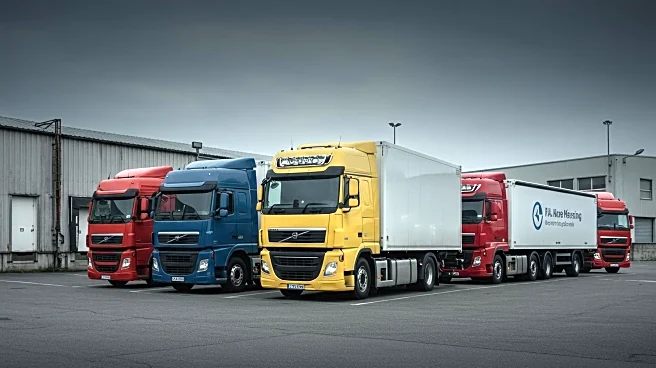What is the story about?
What's Happening?
Daimler Truck, Volvo, Paccar, and International Motors have filed a lawsuit against the state of California, challenging its stringent emissions regulations. This legal action follows President Trump's decision to revoke California's exemption for stricter emissions standards, creating a conflict between federal and state regulations. The truck manufacturers argue that the regulatory uncertainty hampers their production planning. Additionally, the Clean Truck Partnership, formed in 2023 by nine truck manufacturers, the California Air Resources Board (CARB), and the Engine Manufacturers Association (EMA), is being dissolved. The partnership initially aimed to comply with California's vehicle standards, providing planning security for the involved parties. However, the alliance has now broken down, marking a significant shift in strategy.
Why It's Important?
The lawsuit highlights the ongoing tension between federal and state authorities over environmental regulations. The outcome could significantly impact the trucking industry, which is caught between differing regulatory standards. If California's regulations are upheld, manufacturers may face increased production costs and logistical challenges, potentially affecting their competitiveness. Conversely, if the federal government's stance prevails, it could lead to a rollback of stringent environmental protections, impacting air quality and public health. The dissolution of the Clean Truck Partnership also underscores the challenges in achieving industry-wide cooperation on environmental standards.
What's Next?
The federal court in Sacramento will hear the case, and its decision could set a precedent for future regulatory conflicts between state and federal governments. Other companies in the former Clean Truck Partnership, such as Cummins, Ford, General Motors, and Stellantis, have not joined the lawsuit, leaving their next steps uncertain. Their reactions could influence the broader industry response and shape future collaborations on emissions standards. Stakeholders, including environmental groups and industry leaders, will likely monitor the case closely, as its outcome could have far-reaching implications for emissions regulations nationwide.
Beyond the Headlines
The legal battle raises questions about the balance of power between state and federal governments in setting environmental policies. It also highlights the complexities of aligning industry practices with evolving regulatory landscapes. The case may prompt discussions on the need for standardized national emissions regulations to provide clarity and stability for manufacturers while ensuring environmental protection. Additionally, the dissolution of the Clean Truck Partnership may lead to increased scrutiny of industry collaborations and their effectiveness in achieving environmental goals.

















